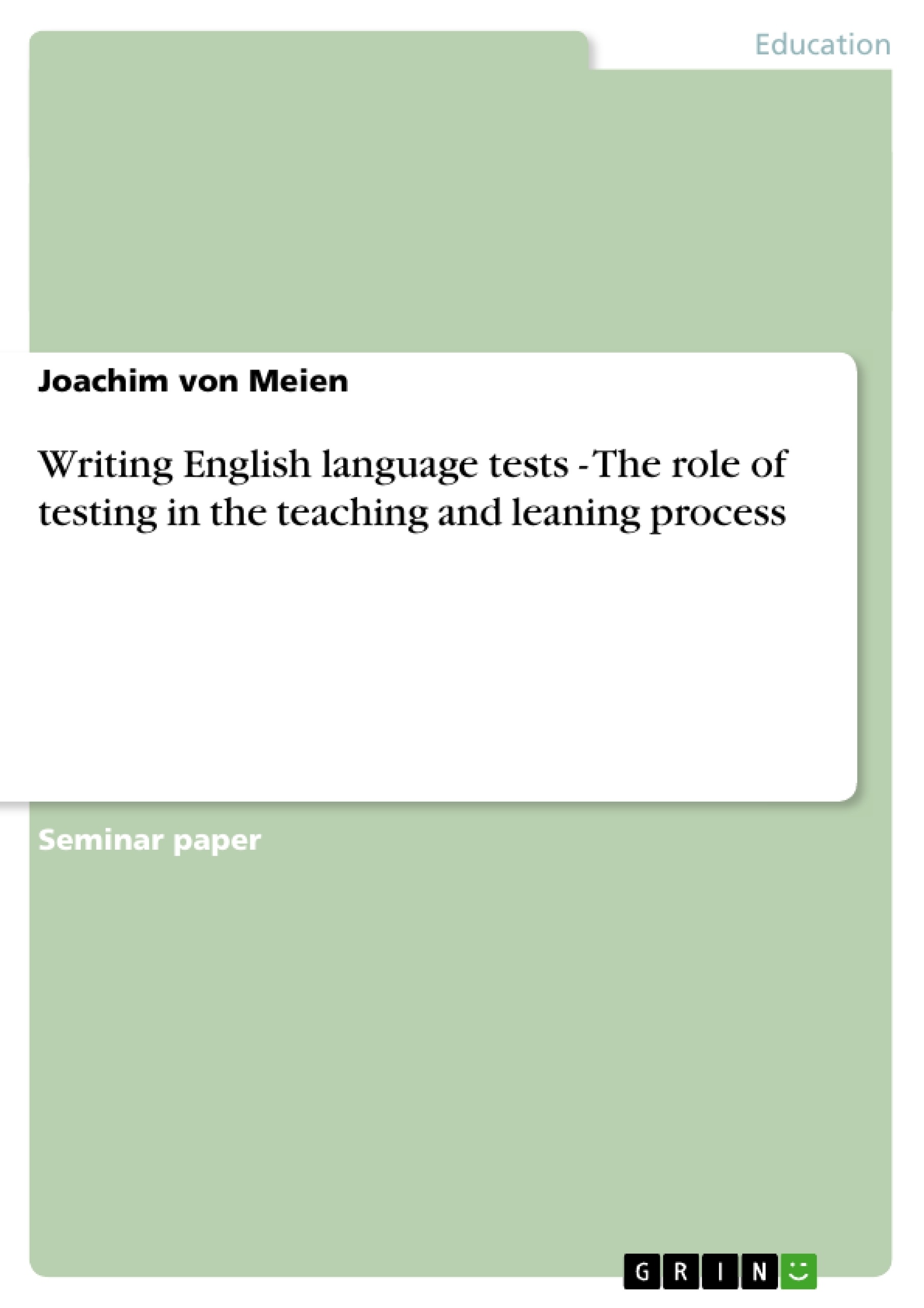Writing English language tests is a topic very many students and of course also their teachers have to deal with. Often testing does not have a very good reputation, especially when regarding the students. Most of them are probably happy when a test is over and enjoy the time without them. But testing has much more functions than a superficial look at it will provide. Chapter 3.1 of this paper deals with the numerous purposes and is also supposed to show the important role that testing plays in the teaching process. This paper will concentrate on the writing skill and the evaluation of it. The other three skills reading, listening and speaking are not the centre of research. But it is not possible to exclude them because they are all interrelated to the writing skill as this paper wants to show. What is it that makes especially the writing skill and also the testing of it so sophisticating and complex? Writing at an advanced level is usually compositional writing or essay writing. Chapter 2.3 concentrates on that kind of writing and points out its often difficult prerequisites, even for writers in the native language.
What are the necessary features of tests in general? It is supposed to become clear that certain conditions such as validity, reliability and practicality are extremely important for written assessment and for every other assessment too. Many people, even if they never actively scored a test, are able to imagine the difficulties of a fair and objective judgement. Especially when dealing with compositional writing, that assumption is true. But nevertheless there are ways to improve the objectivity of evaluation even if a rest of subjectivity can not be avoided. Chapter 3.5 focuses on ways to judge tests adequately. Writing English language tests is a wide topic. It is not possible to cover all the separate areas that exist. Especially the description of compositional writing could have gone more into detail. But at some points a concentration on main areas was necessary in order not to exceed the frame of the paper.
Inhaltsverzeichnis (Table of Contents)
- Preface
- Writing Skills
- Definition of Essential Terms
- Conditions for Writing in English
- The Development of Compositional Writing
- Writing of Tests
- The Purpose of Testing
- Validity
- Reliability
- Practicality
- Scoring of Tests
- Conclusion
Zielsetzung und Themenschwerpunkte (Objectives and Key Themes)
This paper aims to examine the process of writing English language tests, focusing specifically on the writing skill and its assessment. It explores the various purposes of testing, emphasizing its crucial role in the teaching process. The paper also investigates the challenges of writing at an advanced level, particularly in the context of compositional writing, and the importance of ensuring validity, reliability, and practicality in test construction. Furthermore, it examines the complexities of scoring tests, particularly those involving compositional writing.
- The role and purpose of English language testing in education
- The unique challenges of assessing writing skills, particularly compositional writing
- The importance of ensuring test validity, reliability, and practicality
- The complexities of scoring written tests, particularly those involving subjective assessments
- The interconnectedness of the four language skills (reading, writing, listening, speaking)
Zusammenfassung der Kapitel (Chapter Summaries)
- Preface: The preface introduces the topic of writing English language tests and highlights the significance of testing in the educational process. It also emphasizes the paper's focus on the writing skill and the challenges of assessing it.
- 2.1 Definition of Essential Terms: This chapter provides brief definitions of the terms "English" and "test." It discusses the global role of English as an international language and its importance in communication. The chapter also briefly touches upon the concept of language as a complex system of communication.
- 2.2 Conditions for Writing in English: This chapter outlines the key conditions necessary for successful writing in English. It compares writing to other language skills, highlighting its active nature and the challenges it presents compared to receptive skills like listening and reading. The chapter also discusses the importance of mastering mechanical skills, grammatical accuracy, content organization, and stylistic elements for effective writing.
Schlüsselwörter (Keywords)
This paper focuses on key concepts related to writing English language tests, including writing skills, compositional writing, test validity, reliability, practicality, scoring, and the interconnectedness of the four language skills (reading, writing, listening, and speaking).
Frequently Asked Questions
What are the essential features of a good language test?
A high-quality test must fulfill three main criteria: validity (measuring what it is supposed to measure), reliability (consistency of results), and practicality (feasibility of administration).
Why is assessing writing skills considered complex?
Writing, especially at an advanced level (compositional/essay writing), involves mastering mechanical skills, grammatical accuracy, stylistic elements, and complex content organization, making objective scoring difficult.
How can the objectivity of scoring written essays be improved?
While some subjectivity is unavoidable, objectivity can be enhanced through standardized scoring rubrics, clear evaluation criteria, and multiple markers.
What is the role of testing in the teaching and learning process?
Testing goes beyond grading; it serves various purposes, including diagnosing student needs, providing feedback, motivating learners, and evaluating the effectiveness of teaching methods.
Are the four language skills interrelated in testing?
Yes, although this paper focuses on writing, it acknowledges that reading, listening, and speaking are interrelated and often influence performance in written assessments.
What distinguishes writing from receptive language skills like listening?
Writing is an active, productive skill that requires the learner to generate language from scratch, which is generally more challenging than receptive skills like listening or reading.
- Quote paper
- Joachim von Meien (Author), 2004, Writing English language tests - The role of testing in the teaching and leaning process, Munich, GRIN Verlag, https://www.grin.com/document/33649



